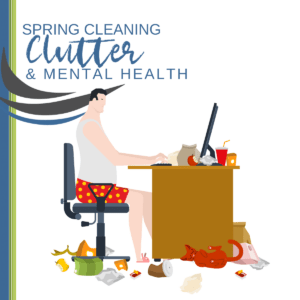 Life is not “neat and clean”. Life is messy. Along with mess is clutter. Our physical environment can affect our emotional state, and this is different for each person. One important question to consider is how does clutter affect you?
Life is not “neat and clean”. Life is messy. Along with mess is clutter. Our physical environment can affect our emotional state, and this is different for each person. One important question to consider is how does clutter affect you?
I know firsthand that when sharing a space, clutter can accumulate quickly. We all have spaces that feel disorganized. It may be a hidden “junk drawer”, unorganized desk space, or messy closet. For some people, it may be their entire living space. Are you feeling overwhelmed by clutter? If so, it may be time to do some spring cleaning!
One thing to keep in mind is that clutter is defined as a collection of things, lying around in an untidy mass. This is different from an organized collection of possessions as in the maximalist decorating style which is in contrast to minimalist design. As we have spent more time in our physical spaces, we want to surround ourselves in a space that feels appeals to our mood, while also is functional.
An accumulation of clutter not only creates more obstacles to functionality but can contribute to feeling overwhelmed and make concentration more difficult. Individuals with attention-deficit-hyperactivity-disorder (ADHD) are impacted by inattentive symptoms such as being easily distracted, often losing things that are necessary to complete tasks, and having difficulty organizing tasks. A chaotic environment can make task completion much more difficult.
For individuals who struggle with depression, there in decreased interest in activities that were once enjoyable. Fatigue, decreased motivation, and feelings of hopelessness make completion of household tasks difficult. A common response to feeling overwhelmed is avoidance. Unfortunately, this only contributes to the accumulation of clutter and patterns of avoidance.
Cluttering is not the same as hoarding. A person who struggles with a hoarding disorder keeps unnecessary items and has significant difficulties parting with possession, regardless of their actual value. Items are often viewed as worthless to others; however, the act of discarding items causes significant emotional distress. Behaviors of hoarding create unsafe living conditions and may need outside intervention from family or other concerned individuals.
For many people, getting started is often the most difficult step. Here are some ideas to help you get started with de-cluttering:
Have a Goal and Set Realistic Standards
What is your goal and is it realistic? One drawer or closet at a time may be more realistic than doing an extreme de-clutter. Incorporating tidying with even just 15 minutes a day as part of a routine makes a difference.
Learn to Let Go
Working with the emotions such as guilt when parting with items can be difficult; therefore, it can help to start out slowly and challenge yourself as this becomes easier. Processing difficult emotions in therapy may be beneficial to help work through emotional roadblocks. Letting go of control and perfectionism is another big one, especially when sharing space with someone who is more prone to being “messy”. Learn to let go.
Compare & Organize Items
Laying items out visually can help to compare what you truly love and want to keep. Plus, it makes it easier to find a “home” once you decide what stays and what goes. Finding a place for similar items adds to the functionality of your space and makes it easier to organize and locate what you need, when you need it.
Encourage Support
If you share your space, encourage others to join you. Remember that you don’t have control over others’ spaces and habits but you can communicate how you are impacted. Being specific about what is bothersome while having a positive attitude can help elicit support.
Get Inspired & Have Fun
Listen and learn from others who inspire you to declutter. Get inspired by visuals of what kind of space is pleasing to you. Lastly, remember to have fun!
To schedule an appointment with one of our professional counselors, click here.
Written By: Charlotte Johnson, MA, LPCC
We’re Here to help
Our wellness experts will be happy to take care of you. You can CLICK HERE to schedule an appointment now or call (612)223-8898.
Meet Clinicians
We’re united by our commitment to providing effective, relevant, and innovative mental health support at all stages of your journey. Click Here to find out more about who we are, where we come from, and how we live out CARE’s mission every day.
The professionals at CARE are actively collecting and creating resources to help with what you need. We’re Here for You.



